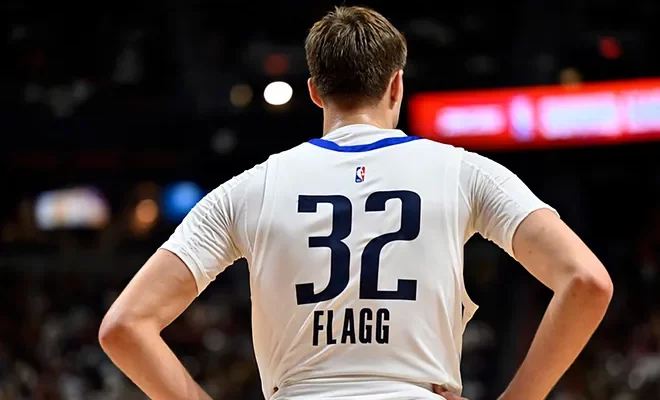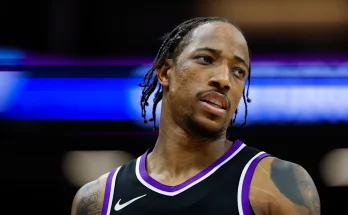Cooper Flagg is emerging as one of the most promising young talents in the NBA, and all eyes are on the Dallas Mavericks as they prepare to unleash his potential in the upcoming season. The buzz around Flagg is palpable, fueled by his extraordinary skill set, versatile playing style, and his ability to impact the game on both ends of the floor. However, while excitement builds around his expected leadership role in the Mavericks’ offense, there are still several critical questions that remain unanswered about how he will handle the pressure and responsibilities that come with such a pivotal position.
Flagg’s rise has been meteoric. From his early days in high school to his standout performances in collegiate and international play, his combination of size, athleticism, and basketball IQ set him apart from his peers. Standing around 6-foot-7 with a wingspan that allows him to guard multiple positions effectively, Flagg offers the Mavericks a rare blend of perimeter skills and interior presence. His ability to create shots for himself and others, coupled with his defensive instincts, makes him an invaluable asset on both ends of the court.
What makes Flagg particularly intriguing is his playmaking ability. Unlike many players of his size, he has a refined feel for the game, often making the right pass at the right moment and reading defenses with a maturity beyond his years. This has led many analysts and fans to speculate that he could be the Mavericks’ new primary ball-handler or at least a critical secondary playmaker, creating opportunities for teammates like Luka Dončić and others. His versatility in the offense could allow Dallas to diversify their attack and keep defenses guessing.
Yet, with all this potential comes a series of questions that need answering. Leadership in the NBA is not just about talent — it’s about mentality, consistency, and the ability to thrive under pressure. For a young player like Flagg, stepping into a leading role means shouldering the expectations of a franchise hungry for success, managing the spotlight, and maintaining focus amid the inevitable highs and lows of a grueling NBA season.
One major question revolves around Flagg’s ability to adapt to the pace and physicality of the NBA. While his collegiate and international performances have been impressive, the jump to the professional level is significant. The speed of the game, the complexity of defensive schemes, and the physical toll on players are all elevated factors. Flagg’s capacity to not only keep up but to excel amidst these challenges will largely determine how effective he can be as a leader on the court.
Another area of scrutiny is Flagg’s mental toughness and maturity. Leading an NBA team requires more than skill; it demands resilience in the face of adversity, the ability to bounce back from poor performances, and the poise to make smart decisions when stakes are high. While reports suggest that Flagg has a strong work ethic and a humble attitude, the pressure of being a franchise cornerstone can expose weaknesses in even the most talented athletes. How Flagg handles these pressures will be critical to his development and the Mavericks’ overall success.
The Mavericks’ coaching staff plays a pivotal role in this equation. Head coach Jason Kidd and his team have a reputation for developing young players and tailoring their system to maximize individual strengths. Kidd’s experience and ability to mentor emerging stars could be instrumental in helping Flagg transition smoothly into a leadership role. The degree to which the coaching staff can build Flagg’s confidence, manage his minutes effectively, and ease him into high-pressure situations will be closely watched.
Another factor to consider is how Flagg’s style meshes with the existing Mavericks roster. Dallas has a collection of talented players, including seasoned veterans and dynamic scorers. Integrating Flagg as a central figure means adjusting roles, offensive schemes, and defensive assignments. There are questions about whether the team can effectively balance Flagg’s development with the immediate goal of winning games. Team chemistry and role clarity will be essential to ensure that Flagg’s emergence enhances rather than disrupts the Mavericks’ flow.
From a physical standpoint, Flagg’s health and durability are also under scrutiny. His playing style is aggressive and involves significant physical exertion on both ends of the floor. Maintaining his health throughout the long NBA season is vital. Injuries can derail promising careers, and the Mavericks will be cautious in managing his workload to keep him fresh and effective deep into the playoffs.
The media and fan expectations add another layer of complexity. The Dallas Mavericks fan base is passionate and vocal, often demanding excellence from their team’s stars. Flagg’s every move will be analyzed, and any struggles could lead to intense scrutiny. Managing external pressure while staying focused on improvement is a balancing act that many young stars find challenging. Support from teammates, coaches, and the organization will be crucial in helping Flagg navigate this environment.
Despite these questions, there is undeniable optimism surrounding Cooper Flagg’s future with the Mavericks. His talent and potential are evident, and the organization appears committed to nurturing his growth. Early training camp reports indicate that Flagg is eager to learn and improve, embracing the challenges ahead with determination. His ability to absorb coaching, adapt to team dynamics, and perform consistently will be key markers to watch in the coming months.
The narrative around Flagg is also about what he represents for the Mavericks’ future. The franchise is at a crossroads, looking to blend veteran leadership with youthful energy. Flagg’s arrival signals a potential new era where the team’s identity is shaped around versatile, high-IQ players capable of impacting the game in multiple ways. If Flagg can step up as the Mavericks’ offensive catalyst, it could propel Dallas back into serious playoff contention and excite fans about the team’s trajectory.
In conclusion, Cooper Flagg’s role with the Dallas Mavericks is both an exciting prospect and a challenging opportunity. His skills and potential to lead the offense are clear, but the path ahead is filled with questions about his adaptability, mental toughness, health, and integration into the team. How he responds to these challenges will define his career and could shape the Mavericks’ success for years to come. For now, the basketball world watches with anticipation as Cooper Flagg prepares to take the next step in his journey, hopeful that he will rise to the occasion and become the leader Dallas so eagerly needs.



